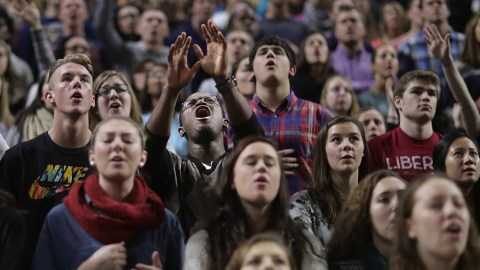The Rise and Not-Quite-Fall of Religion in American Politics

Religion and politics are old bedfellows generally—for millennia the two were indistinguishable. But to understand how we’ve arrived at where we are today, we need only travel back to the last great economic crash: the Great Depression.
As Americans were trying to piece together any semblance of identity, and as Roosevelt initiated the sweeping reforms of the New Deal, a grumbling was heard emanating from conservative America. And those grumblers decided religion was the missing piece in their evolving jigsaw.
In America, the Right began embracing religion with capitalistic furor in the thirties, so argues Princeton history professor Kevin M Kruse. While it was the election of Dwight Eisenhower two decades later that changed the nation’s relationship with the sacred—the era of “under God” added to the Pledge of Allegiance and “In God We Trust” inscribed on postage stamps and money, finally becoming the nation’s first official motto in 1956—the ascension of capitalist theology was built on the back of Roosevelt haters.
Corporate behemoths and manufacture lobbies, such as the National Association of Manufacturers and the US Chamber of Commerce, employed clergymen to promote conservative political values. In big part thanks to Congregationalist minister James W. Fifield, Jr, who promised the “titans of industry,” as Kruse phrases it, that they were not to blame for the financial havoc that led to the Depression, but rather were the nation’s salvation, suddenly CEO’s across the land had their come to Jesus moment. As faith filled their hearts, donations filled Fifield’s coffers.
Kruse continues,
They saw Christianity and capitalism as inextricably intertwined and argued that the spreading of the gospel of one required spreading the gospel of the other. The two systems had been linked before, of course, but always in terms of their shared social characteristics. Fifield’s important innovation was his insistence that Christianity and capitalism were political soul mates, first and foremost.
Unsurprisingly, by 1942, just two years after Fifield promised corporate salvation to his elite, his Los Angeles church went from being in massive debt to turning a hefty profit. Beyond his palm-shaded church, he set into motion a relationship to the divine that remains strong in today’s prosperity theologians. More importantly, the Religious Right was born, and for over seventy-five years has heavily influenced our nation’s politics.
Until now. Undoubtedly many single-issue voters will emerge this year. Trump’s bewildering ascension has exposed many holes in his party’s messaging, but one of the most prominent yet under-discussed is the role of religion. He was not scolded for his 2 Corinthians gaff, nor is any of the heat of his abortion flip-flopping coming from his supporters.
Is this pointing toward a less religious nation? In part. People discuss how Trump has tapped into an underlying anger. Yet he has also exploited another human characteristic, one we hate to admit: hypocrisy. Religious foundations such as charity, kindness, and compassion are absent in his rhetoric—which, in many ways, circles back to the origins of the Religious Right. It was never about salvation for all, only for those with the money to purchase it. Given that many Trump supporters are inspired by his self-funded campaign, it would appear not much has changed at all. He’s just shed the religious messaging and gotten straight to the point.
—
Image: Chip Somodevilia / Getty Images
Derek Beres is a Los-Angeles based author, music producer, and yoga/fitness instructor at Equinox Fitness. Stay in touch @derekberes.





